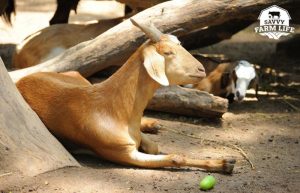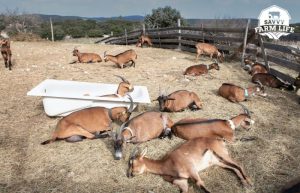
What to Know About How Goats Sleep
Have you ever seen a sleeping goat? Perhaps you have visited your barn or pasture in the middle of the night or the early morning hours, only to find your goats awake and alert as always. I know I’ve done this. You may be scratching your head, wondering whether your herd of goats ever actually go to bed. Have you ever wondered why that is and how goats sleep?
How do goats sleep? Like humans, goats tend to do most of their sleeping at night, sleeping on average 5 hours during the night-time. Like other livestock animals, goats will also doze and rest for short increments throughout the day. Due to their prey animal nature, goats are incredibly light sleepers, so it can be difficult to ever catch them in the act of sleeping.
Sleep is just as crucial to goats as it is to humans. If a goat isn’t getting sleep, it can signify that they are stressed, depressed, or even sick. To learn more about a goat’s sleeping habits, keep reading!
How Much Sleep Do Goats Need?
Many have suggested that wild goats do not sleep because of how difficult it is to document a goat sleeping in the wild. The truth is, there is no animal on Earth that we know of that does not need sleep to survive. With that said, the amount of sleep required varies significantly among the animal kingdom, with some animals needing only a few mere hours of sleep while others sleep 20 hours out of the day. Where do goats lie on this spectrum?
Herbivore vs. Carnivore Sleep Needs
One factor in determining how much sleep is needed can be found in the animal’s diet. The protein-rich meat in the carnivore’s diet will pack a higher calorie punch than the plant-based diet of the herbivore. This means herbivores will need to spend more time eating to fulfill their nutritional needs. For that reason, the biology of the herbivore does not require as much sleep as the carnivore since the plant-eater will need to spend more of its time in search of food than the meat-eater.
I’ve noticed that my livestock animals tend to sleep much less compared to my dogs. The livestock animals will spend their day eating. When they’re not eating, they usually doze in the sun or under a tree. On the other hand, my dogs will have bursts of energy and then take a more extended sleeping break in-between. This is an excellent example of the different sleeping habits of the two types of animals.
Sleep Needs of Domestic Goats
While it is challenging to research the sleep habits of wild goats, it is (slightly) easier to determine how much sleep domestic goats need. It has been shown that domestic goats will sleep an average of 5 hours per night, with short naps during the day. How short are these naps? Shorter than you or I might be used to – domestic goats take up to 6 naps per day, and these naps average about 5 minutes each. Domestic goats (and, therefore, likely wild goats) have also been shown to have REM and dream sleep in studies that have been done, proving that while they are light sleepers, they do reach deep and restorative sleep.
Why Is It So Hard to Catch A Goat Sleeping?
It isn’t easy to catch a goat sleeping because they are incredibly light sleepers. This is because they are prey animals – and like other prey animals, they need to be able to run at the slightest hint of danger. Goats do not sleep deeply for long periods, and they will wake at the slightest noise that their subconscious may deem to be a threat to them.
Because goats are both consciously and subconsciously always on the lookout for danger, they will usually not sleep out in the open. They will find a hidden spot to sleep, where they feel protected. For this reason, and because they are such light sleepers, it is no wonder it is a challenge to catch your goats snoozing! They will hear you approaching before you catch sight of them, and they will be up and moving before you find them.
How Goats Sleep
Now that you know how much sleep a goat needs, let’s look into how goats sleep.
Do Goats Sleep Lying Down or Standing Up?
 Goats do not have legs that lock while sleeping as horses do. Therefore goats do not sleep standing up but lying down. It is more common to see goats sleeping in an upright position rather than on their sides. This is so that they can jump up and run away as soon as they suspect there may be danger lurking. Combined with how lightly they sleep, it’s no wonder it is not easy to catch a goat sleeping!
Goats do not have legs that lock while sleeping as horses do. Therefore goats do not sleep standing up but lying down. It is more common to see goats sleeping in an upright position rather than on their sides. This is so that they can jump up and run away as soon as they suspect there may be danger lurking. Combined with how lightly they sleep, it’s no wonder it is not easy to catch a goat sleeping!
Of course, it is not entirely uncommon to find a goat sleeping on its side. Like a side-sleeping horse, this means that the goat feels comfortable and secure in its surroundings. There will often be other goats around, which will add to the feeling of security for them.
Do Goats Sleep With Their Eyes Open?
No, goats do not sleep with their eyes open. While some animals can sleep with their eyes, or one eye, open for defense purposes, goats are not one of them. Goats sleep with both eyes closed, like you and I.
Goats also do not sleep with half of their brain alert (called unihemispheric sleep). Marine mammals that must come to the surface for air, some birds that are accustomed to a long flight, and possibly some reptiles can sleep with half of their brain alert for necessary biological functions or if they are in a particularly hostile environment. Goats do not sleep this way; instead, they rely on their light sleep to protect them, able to wake immediately upon even the slightest sound or hint of danger.
Where Do Goats Sleep?
Where goats choose to lay their heads down will depend entirely on environmental conditions. Because goats are herd animals, they will always feel more comfortable and safe with other goats. If you are fortunate enough to catch your goats sleeping, you may see them cuddling with one another! Half of the herd may often catch a snooze while the other half remains alert, swapping places with their watchful friends after their nap. When the days are hot, I often see my goats dozing together under one of the trees in their pen.
Weather Affects Where Goats Sleep
Typically, goats need a 3-sided shelter to protect them from the wind and rain. However, this may change depending on your climate. In frigid temperatures, you may want to keep your goats in an enclosed barn, protected from the cold. In warm climates and during hot Summers, many goats prefer to sleep under a tree canopy, on a picnic table, or even on the roof of a chicken coop.
Predators Affect Where Goats Sleep
Where your goats sleep will also depend on the predators you have in your region and how protected the goats are in their run. If your goats have the run of the land, you will want to lock them into an enclosure (or barn stall) at night to protect them from night-time predators. If your goats are secure in a run, and you have electric fencing or another impenetrable fencing to keep predators out, you can give them a bit more choice in where they sleep.
Bedding For Goats
Wherever your goats choose to sleep, it is vital to ensure the environment is clean and sanitary. If they sleep in a barn or a shelter, it is crucial to keep the ground dry. In colder climates where the ground may freeze, you’ll want to build a platform inside the stall or shelter to help the goats escape the cold ground (this can be as simple as a couple of pallets on the floor). You can use straw, pellets, wood shavings, or even leaves as bedding for the goats; make sure to change them out as they become soiled. The bedding also helps keep the goats warmer in the cold Winters, and as a bonus, it will provide you with nutrient-dense compost!
To learn more about caring for goats in the winter, check out my article Do Goats Get Cold? Winter Goat Care Guide.
It is imperative to ensure that if kept in a barn stall or enclosed shelter at night, the goat shelter is dry, clean, and has plenty of ventilation. Goats are not concerned about eliminating waste where they sleep, so they need fresh bedding regularly to ensure optimal health.
Goats Are Private About Their Sleeping Habits
Wherever your goats sleep, you will need to be pretty sneaky to catch them in the act. If you see your goats mid-snooze, consider yourself lucky, considering the light sleepers they are!
Since goats live outside for most of their lives, it can be easy for them to pick up both internal and external parasites. To learn how to deal with fleas on your goats, check out my article Do Goats Get Fleas? Essential Goat Care Guide.
